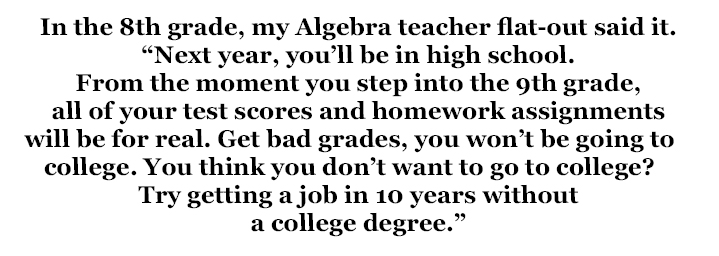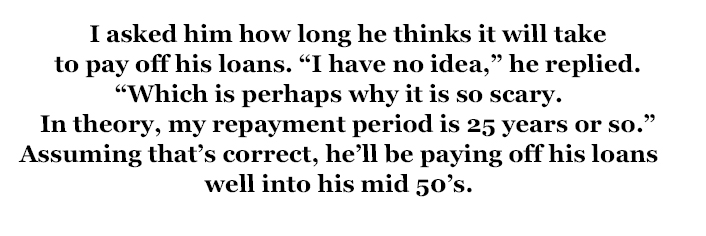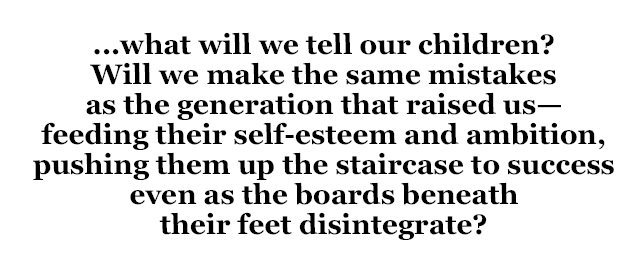Desi and I tried to picture the country in 50 years, as a kind of parlor game. “Oh! Mushroom cloud! It’s going to be a disaster!” he said. “It’s so overwhelming there’s nothing in particular to be worried about.” We both laughed, because it’s true.
– Noreen Malone, “The Kids Are Actually Sort of Alright: My screwed, coddled, self-absorbed, mocked, surprisingly resilient generation.” New York Magazine.
I think it was the 8th grade when I first became conscious of the Grand Plan. Throughout elementary school and middle school, I had ignored the whisperings and vague illusions from teachers that, one day, we would reach a year when our grades would begin to “count.” In the 8th grade, my Algebra teacher flat-out said it. “Next year, you’ll be in high school. From the moment you step into the 9th grade, all of your test scores and homework assignments will be for real. Get bad grades, you won’t be going to college. You think you don’t want to go to college? Try getting a job in 10 years without a college degree.” Kids around me murmured and laughed. A few, who clearly had already developed high hopes for their futures, went pale and quiet at the thought. At the age of 13, I was only a few years beyond wanting to be a ballerina when I grew up, but suddenly the outline of my future appeared before me. High School, College, a job, a marriage, a house. All of these were in a state of constant jeopardy, depending on my performance. Never before had the future seemed like a tangible object. It had never seemed like something I could shape and alter with my own hands. It had never seemed like something I could break.
A couple months ago, I emailed an article to my friend Clint. From New York Magazine, it was the latest in a string of pieces I’d read intended to explain the angst of my generation. Noreen Malone described what she called “two long-term social experiments conducted by our parents,” the over-attentive, minivan-driving baby boomers:
The first sought to create little hyperachievers encouraged to explore our interests and talents, so long as that could be spun for maximum effect on a college application. (I would like to take this forum to at last admit that my co-secretaryship of the math club had nothing to do with any passion for numbers and much to do with the extra-credit points.) In the second experiment, which was a reaction to their own distant moms and dads, our parents tried to see how much self-confidence they could pack into us, like so many overstuffed microfiber love seats, and accordingly we were awarded clip-art Certificates of Participation just for showing up.
And then she interviewed her friends and acquaintances to describe the ill effects of those experiments, all grown up and exposed to a world in which praise is no longer forthcoming and even the highest-achieving students are unemployed. Clint replied to me a couple hours later, “My first impression after reading this is ‘Holy crud, the examples are me!’ (And probably half the people I know, come to think of it…)” Four minutes passed and he added an addendum to his comments, “This is quite possibly an ironic statement, considering the article’s stance on our generation’s self-centeredness.” As I read the article, I considered whether Clint, half the people he knows, and I had all been done a great disservice by those who told us that a college degree was the ultimate goal, the achievement to which all our adolescent endeavors should be directed. If we had been told, instead, that college was one option among many—an option which may or may not lead to a job and a better salary once completed—maybe fewer would have taken out tens of thousands of dollars in loans in order to attend the “best” school. Maybe we wouldn’t have been surprised when the “best” school didn’t bring us any closer to success or happiness than any other option would have.
Christopher, from Colorado, has $100,000 in debt. He got his Bachelor’s in philosophy in-state at the University of Colorado-Boulder. He went to graduate school for Public Administration at the University of Colorado-Denver. He had a lot of options—even a full-ride scholarship to a Law School in New York City—but, given the cost of living expenses, staying in Colorado was actually the least expensive route. I asked him how long he thinks it will take to pay off his loans. “I have no idea,” he replied. “Which is perhaps why it is so scary. In theory, my repayment period is 25 years or so.” Assuming that’s correct, he’ll be paying off his loans well into his mid 50’s. So far, he says it hasn’t affected him much. “But that is also because I have been in the grace period,” he said. “I have to start paying my loans this month and I am already thinking about putting off a move. So I foresee it being a problem.”
When I asked him whether college had been worth it, he replied, “It is hard to say. I am grateful to have received it. I think in an intrinsic sense, then yes. But I am not sure if it will necessarily be a good return on investment from a purely financial perspective.” I could tell from his answers that this was a conflict for him, as it was for most people I talked to. He liked college, but what he liked wasn’t necessarily what the college-pushers have made it about. “I definitely think more critically about the world and world issues,” he said. “I don’t think I got many hard skills that would be useful for employment,” he admitted, “though I don’t think that should be the point of college anyway.”
My buddy Clint, a tall Nordic-looking park ranger with a degree in Speech Communication and English, said pretty much the same thing. “I can say that, regardless of the career I end up with in the long run (or lack thereof,) my education has most certainly been worth the cost… I went into college with the vague assumption it was where you were supposed to go to start up a career. I picked out fields that interested me, barely stopping to consider if it would net me a high wage or a cushy retirement package in the future.” He agreed that college had become too focused on job-attainment. “A quality education is not about building good employees or good consumers or even good citizens,” he said, clearly getting a little fired up. “It is about building good humans.”
Clint and I went to the same college, up in South Dakota. The school wasn’t very expensive and both of us managed to get by on part-time salaries and a little help from our parents. So Clint doesn’t have a monthly student loan payment like most of our friends do. Instead, thanks to his lifelong diabetes, he has a health insurance payment. “I realize now that most of my unhappiness can probably be traced to the $600 a month I need to pay for health care costs,” he wrote to me. “One thing that makes me feel enormously bitter towards pharmaceuticals and health insurance companies is the realization, were it not for that $600 a month, I could genuinely live the life I want to live. I really could work as a park ranger half of the year and spend the other half traveling. I mean, blimey, that $600 may not sound like much, but it means the world to someone who lives like me.”
Everyone I talked to said something to that effect. No one is expecting to join the upper classes. My friends like Clint don’t even care to join the middle class. He just wants enough money to live the simple, meaningful life he imagines for himself. And an extra $600 a month is all it would take. “Anyone who has such high costs,” Clint wrote, “is forced to sell out their desires for freedom, for self-improvement and exploration, for the sake of paying the bills and clinging on to a job that, while not what was desired, is the best they were capable of finding immediately after school.” Despite what you’ve heard, the piece of societal pie to which my generation feels “entitled,” (a word bandied about quite a bit when talking about the Occupy Wall Streeters and anyone else complaining about their student loan debt,) is nowhere near as large as our parents might imagine.
From that same article by Noreen Malone:
there’s evidence to suggest other members of our cohort believe they’ll live a more fulfilled life, have better relationships, even if they don’t live in larger houses or drive fancier cars than their parents. Jean Twenge, author of Generation Me, says the most prominent shift she has seen so far among young people in this economy is an apparent decrease in materialism.
Without debt, a college graduate has a million options from which to choose the life he finds most dignifying. With very little money, he can find places to sleep and the occasional meal while exploring the world. Growing up, I heard all the time from my parents and their friends about the joys of being young and free—hitchhiking in Europe, setting out cross-country with only a few dollars in their pocket. This was supposed to be the promise of young adulthood—a time of liberation before the onset of marriages, kids, and responsibilities. But add a few thousand dollars in student loan debt to that equation and a college graduate has one option: find a well-paying job and quick.
Sarah, from California, is a senior at the University of Colorado-Boulder. She has $80,000 in student loan debt. When I asked her how long she expects to be paying it off, all she said was, “I anticipate [I’ll be] paying off debt until I’m very old.” Soon she’ll have a degree in International Affairs and Peace and Conflict Studies, and she told me, “I have always imagined traveling for a few years after graduation or working abroad.” She also mentioned wanting to make documentaries or start a non-profit, but as graduation approaches, she realized all these goals “will most likely have to be put on hold…depending on how I can make enough money to pay off my debt post college.”
She described herself as “a very optimistic person,” but it was clear the stress of money worries was already taking a toll. “I am still excited about graduating and what I’ll be doing,” she said, “but my main worry is that I’ll get stuck in a job that I hate because I have to pay bills.” Like Clint, she said, “Having a lot of money (and maybe it’s just because I am a broke college student and don’t have any) isn’t a huge priority for me.” But, she acknowledged, “it will have to be once I am paying back my loans.” And there, with a sigh, goes the promise of freedom.
An admission: I don’t know what the purpose of college is supposed to be. Whether higher education is a noble calling—a way of turning slaves into free-thinking men—or merely a path to a career becomes more confusing to me as I see more of my friends, armed with their degree and bright ideas about the future, stunned and shell-shocked to come up against a world with no job to offer them. I used to think I knew. When I was in college, like my friend Clint, I was very much caught up in the mind-expanding promise of a liberal education. I grew resentful of anyone who asked me what I was going to “do” with my English degree. “Waitressing,” I often answered.
Everyone I asked pretty much agreed with that mentality. All humanities or social science majors, we believed in the ability of education to create powerful thinkers and voices of opposition. As Christopher said, “I only went back [to college] when I decided I wanted to grow more intellectually. So I don’t think college ought to be a prerequisite for life (or a good job), but a chance to pursue intellectual topics if one should desire it.” But, the fact remains, when I was a naïve 18 year-old filling out applications, everyone was saying, “This is how you get your career.” Billboards for colleges around town promised “93% career-placement after graduation.” Six months after my college graduation, when I was balancing four plates of pumpkin risotto in two hands and winding my way to another table, I reflected that I hadn’t really meant that I wanted to use my English degree for a life of waitressing.
And so, the question to which I come back again and again: is college worth it?
Brent, a young comedian living in Brooklyn, left college after one semester. He said to me, “I regularly use the Mark Twain quote that’s along the lines of, “Never let school get in the way of a good education.” I think dropping out after one semester may have been the best thing I have ever done. I would have graduated last spring, been in debt, and still have no chance at getting a job.”
Brent has been spending a lot of his time lately in Zuccotti Park with the Occupy Wall Street protests. He has heard the stories of too many people with college degrees and nothing to show for it. As for the “worth” of college, he said, “I think it is a bullshit concept that perpetuates itself to keep the business that is college going. I know a lot of brilliant people that can’t get a job because they don’t have a piece of paper that a less apt/intelligent person does.” And, when he considered whether he had hurt his chances of making money, he said, “Regardless of school, most jobs you still have to learn from doing.” He summed up his argument with a flourish: “I say fuck college. It’s not original. Make your own trail through the jungle of life. Walking on the well worn path is boring.” And I had to wonder if he wasn’t right.
At least one person in Noreen Malone’s article had found his way to the same conclusion:
I have a lot of regret about going to college,” Sam, the person in my high-school class who’d been most obsessed with getting into a good college, now says. “If I could go back again, I think I’d try … not going to college”—our generation’s ultimate blasphemy.
And it raises an interesting question: could we ever sever that tie between college and career? In previous generations, a kid went to work at his Dad’s business after school. At 18, he took a low-ranking position schlepping coffee or making copies. Over the years, he worked his way up. The experience of working formed the basis of his credentials for each advancement. To become an electrician, he worked underneath an electrician for years. To become a secretary, he took a typing class. College was for teachers, lawyers, doctors and ministers—and, for many of those people, it was free.
It’s a strange sort of revolutionary idea—to step back 50 years in the “progress” of our country. And not an idea without drawbacks. One of the biggest problem now is the ratio of graduates to jobs. Too many people fighting for too few positions. And how we solve that, I have no idea. Not to mention, without the pressure for everyone to attend college, fewer young people will encounter Hemingway and Aristotle—and that prospect, I must admit, breaks my English-major’s heart. But if we can hinder the “business” that is higher education in America, then any change is worth it. If the millions of blinkered young people ready to sign away their future incomes for the chance at a college degree were to suddenly disappear, the companies that prey on them would as well. And maybe then colleges could shrink down to a reasonable size, resigning their role as the key-holders to every child’s future.
I have to admit, I was one of the lucky ones. With no debt to my name, I could move across the country after graduation, and a few more times after that—to Connecticut, to California, to Utah. I could leave my waitressing job to attend a literature conference halfway across the country, where I met my future husband and found my future career at his online newspaper. But, for everyone I know, the problems are only growing worse. College tuitions rose again this year, and outstanding student loan debt is predicted to top $1 Trillion this year. More of my former classmates are moving back in with their parents. Depression rates rise by the year. Without a massive program of debt forgiveness, my generation will likely be weighed down for the rest of our lives.
Time passes and, despite our problems, most of us are getting married, having children. Every time I check Facebook someone else is engaged. Some are finding jobs. Some are testing the patience of their unemployment benefits. And life is moving on.
What, I can’t help but wonder, will the future bring for us? A part of me imagines an entire generation of depressed, disillusioned adults, retreating further into virtual entertainments and pharmaceuticals. But, to be honest, I think most of us are more resilient than that. We will likely still make some happiness for ourselves. We will find meaning the same way our ancestors have—in the people around us.
The next question that arises, then, is, what will we tell our children? Will we make the same mistakes as the generation that raised us—feeding their self-esteem and ambition, pushing them up the staircase to success even as the boards beneath their feet disintegrate? When it is time for the ballerinas, and firefighters, and future presidents to start considering their “grand plan” for the future, where will we point them? The future remains so overwhelmingly vague. We don’t know yet—maybe we will never know—how to keep them from sinking beneath the cost of their dreams.
Tonya Stiles is Co-Publisher of the Canyon Country Zephyr.
To read the PDF version of this article, click here.









As a high school teacher in an alternative education setting I often council students concerning future options. Depending on their circumstances I might suggest a GED or other route to a diploma followed by a stint at a community college with the purpose of getting job skills. The object is to have a plan, then follow through.
Looking back at my education, college was for growing up a little more and learning the language of geology. The practice was then learned on-the-job and I didn’t much like it. After ten years of learning other skills I decided that teaching would give me access to enough money and more importantly, time “for myself”. Combining these lessons learned with 21 years I am now free of debt with a roof over my head in a place that I am happy. Most of this happened with some luck and the much opportunity to work “for myself”. Soon I will be leaving the teaching arena and some idea how I’ll make ends meet. It is simply time to move on and I have enough confidence in my skills and resources that I will make ends meet.
Acquiring $20K in debt without a plan is ignorant. $100K is stupid. I know people going back to college for a second degree simply to avoid starting repayment of their first degree loans a bit longer. What are they expecting? Forgiveness? Capitalism is a religion in the USA, but debt forgiveness is only for the high priests.
I dropped out of college 35 years ago to hitchhike around the country. It took me 25 years to find a place I felt comfortable living in. Sisters, OR is a lot like Moab. I will have to work until the day I die but I live simply so I won’t have to work 2000 hours/year.
Reading about these people with crushing college debt, I think about my 29 year old daughter, saddled with $40K in college loans. When she wasn’t able to immediately begin repayment upon receiving her masters degree, the loan company (to whom the loan had been sold by Wells Fargo) immediately demanded total repayment immediately. When contacted, they were not interested in setting up a repayment plan; they wanted it all now. Maybe they think ‘ol Mom and Dad will pay it for her. As my daughter lives/works in the UK, she is pretty much safe from any action they may take, and hopes to pay it off in a few years, but who knows? For the time being, shes saying, “F**k’em.”
In the 1960s and 1970s I went to college and law school on 3% government loans, with some grants and part-time work. I never worried about paying these loans off. It was easy. Jobs were more or less plentiful and we never worried whether social security would be there for us when we retired.
My generation assumed the pie of plenty would be there for hers, while we were busy hogging it down piece by piece. We left her generation with an empty pie plate and sackful of IOUs.